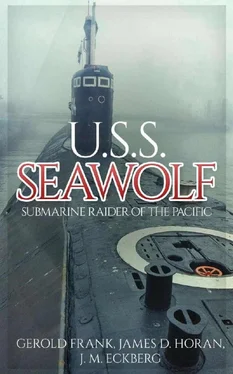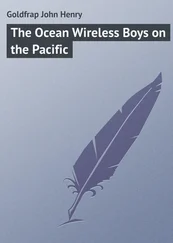On the phones I picked up the sound of the torpedo, a high-pitched whine as she tore through the water. Captain Warder, I knew, had his eyes glued to the periscope. His orders came crisply.
“Stand by to fire two… Fire two!”
Again the hiss, the jar, the gentle kickback, again and again.
As each fish left, I picked it up on sound. The first whine died out, then the second came into my phones. It died out. I waited tensely for the explosions. The skipper kept his eyes glued to the periscope. I listened hard. I had to keep my ears on those torpedoes. An erratic fish can circle about and come back to blow you into Kingdom Come.
Captain Warder’s voice was sharp: “I can see them…. They’re running hot … Jesus! They missed the target! Oh, hell! Make ready the aftertubes. Open outer doors in after-room! Hard right rudder!”
He ordered the Wolf full speed ahead. “All ahead, full! Eckberg, hear those fish run?”
Yes, I had heard them run. But I’d also heard dull thuds. They were like knife thrusts into my heart. I knew what had happened. The torpedoes had missed the target, continued on, and exploded on the beach.
I reported heavily. “Yes, sir. All ran hot and missed the target.”
“Hmmmm,” said the Captain. Then: “Rudy, come to course two seven zero. Let me know when you get there. Sound, do you hear any propellers?”
I searched intently. “No screws, sir.”
“Good!” said the Skipper. He was as disappointed as a man can be, but he hadn’t given up hope yet.
Rudy’s voice came over the intercom: “Steady on course two seven zero, sir.”
“Very well, all ahead one-third,” replied the Captain.
“One-third, sir,” said Rudy.
The Wolf , her speed reduced to one-third, moved slowly forward.
The Captain said: “Up periscope. Are the after tubes ready? Okay. There’s a lot of activity up here, as far as I can see. They are trying to get under way. Come right a little, Rudy… Hold it there, Rudy…. Stand by to fire…. Fire!”
Again I picked up the high, thin whine of the fish.
“Easy now, Rudy… Close the outer doors… All ahead, standard. I see him now…. They’re running straight again—”
I was listening to the fish with all my ears. They were running straight and hot, all right. Then ka-boom! The Wolf shuddered. Then again, and again, and again. This time our torpedoes had run straight and home. The concussion shook us each time.
“Explosions, Captain!” I barked into the mike.
“I can see her!” he snapped back. “Wait… wait… They may have hit in the bow.” Then, eagerly: “I see white water. I see a lot of white water! Down periscope!”
We dared expose our periscope no longer. There was a murmur of conversation between the Skipper and Ensign Mercer. Captain Warder, we learned later, wasn’t sure if our fish struck the Jap or not. The crew to a man was certain that at least one had hit. But Captain Warder did not even claim this ship as damaged. He had not seen it go down. He was not positive.
“Proceed with the reloads,” he finally ordered. “We are expecting company any minute. Keep careful watch, sound.” Then, a moment later: “Send Mr. Syverson up, please.”
In a few minutes the Skipper was talking to Ensign Donald Syverson, torpedo officer, a stubby, red-headed, personable sub man from Michigan.
“I can’t understand it,” the Captain said quickly. “I don’t know what was wrong with those first fish. Got any ideas about it?”
“No, sir.” Syverson sounded crestfallen. “We readied them according to instructions, Captain. I inspected them myself.”
“I can’t figure it out,” said the Skipper, musingly.
I began hearing telltale sounds again. Ping!… ping… ping!
“Got a ship up there, Captain,” I announced.
“Propellers or pings, Eckberg?”
“Pings, Captain. I think they’re on the starboard side, well aft.”
“What do you mean, they? More than one?”
“Yes, sir. I hear two of them.”
We waited. And then, far distant, a muffled boom! The Wolf shook. Her joints creaked. The lights flickered, went out for a moment, then on again. It was a depth charge, mild because it was some distance away. Actually, no depth charge attack can be called mild, because when 700 or 800 pounds of TNT explode in your general vicinity, any number of things can happen. A depth charge doesn’t have to score a direct hit to sink you. Water is incompressible. An explosion can write your finish if it’s near enough for the concussion to place sufficient pressure on the water surrounding your boat to stave it in or crush it altogether.
The exploding charges were something special to hear. They sounded as though a giant smashed together boulders as large as houses under the water with pulverizing force. If you’ve ever heard two stones struck together under water, you know how booming and terrifying that small report can sound, intensified and expanded by the water. But this charge, and the one or two that followed, were too far away to harm us. And after a while, there were no, more explosions and no more pings.
“Hear any propellers about?” asked the Skipper. I said no, and he ordered the boat taken to the regular diving depth. We cruised back into rough water; water so rough I could hear the choppy waves rippling the surface of the sea. A few minutes later, Captain Warder ordered the periscope up again. He spent five long minutes scanning the water.
“Hell, it’s black up here tonight,” he murmured. “Damn rough, too. There’s a fire near the beach. That might be one of our ships burning. It’s so black up here I can’t see the land at all…. Well, we’ll head out to open sea and charge batteries.”
For some nights and days we made routine patrols, and then one night we began one of the most dangerous tasks a submarine can undertake in wartime—relocating our torpedoes. The Wolf had space on deck to stow extra torpedoes. Since these are massive weapons, relocating them—moving them from the deck to the torpedo rooms below—is a sizable job. Booms must be rigged, loading hatches must be opened, and the submarine is exposed to any attack. Her men are topside, live torpedoes are dangling from the booms, hatches are open, and a crash dive is impossible. Here, particularly, with Jap land all about us, we’d be a sitting duck for the first plane or destroyer to sight us.
The Skipper took every precaution. While he scanned his charts in the control room, the four men who were to take over the bridge lookouts when we surfaced lounged in the mess hall reading magazines through infrared glasses, preparing their eyes for the darkness above. Captain Warder finally decided to surface in the lee of a small island. The brassy, harsh surface horn jangled. The Wolf slowly rose.
“Open the hatch,” the Skipper ordered.
The toggle-bolts were whirled loose, the hatch was pushed open. There was a rush of air like a small gale sweeping past us.
The Seawolf bobbed gently on the surface of the sea.
Word came from topside that a radio insulator—one of the two on which my antenna was strung—was smashed. I asked permission to go topside and fix it.
“I don’t know, Eckberg,” Captain Warder said dubiously, rubbing his chin. “We’re not in a healthy place. They can ram us or shell us before we can get down. The less people I have on the bridge, the better I like it.”
But our antenna might snap, I said, and I could fix it in a couple of minutes. Okay, he said, go ahead—but fast. I climbed up the ladder and out into God’s fresh air. The clouds had vanished, and now the night was perfect. The full moon, bright as a new penny, flooded the ocean with its light. The high seas had died down; the water was calm, with only the gentlest swell running. I took a deep breath and tasted the heavy salt air. It was so heavy I felt dizzy. I could see the thin outline of a small island less than half a mile away. I breathed deeply again. I couldn’t get enough fresh air into my lungs. This was the first time since Manila that I had been topside, under the sky. It seemed a long time then, but I was to learn that it was nothing compared to what was in store for us later.
Читать дальше






![Hubert Bancroft - The Native Races [of the Pacific states], Volume 5, Primitive History](/books/749157/hubert-bancroft-the-native-races-of-the-pacific-s-thumb.webp)

![Hubert Bancroft - The Native Races [of the Pacific states], Volume 1, Wild Tribes](/books/750126/hubert-bancroft-the-native-races-of-the-pacific-s-thumb.webp)



![Edward Ellis - Adrift on the Pacific - A Boys [sic] Story of the Sea and its Perils](/books/753342/edward-ellis-adrift-on-the-pacific-a-boys-sic-s-thumb.webp)